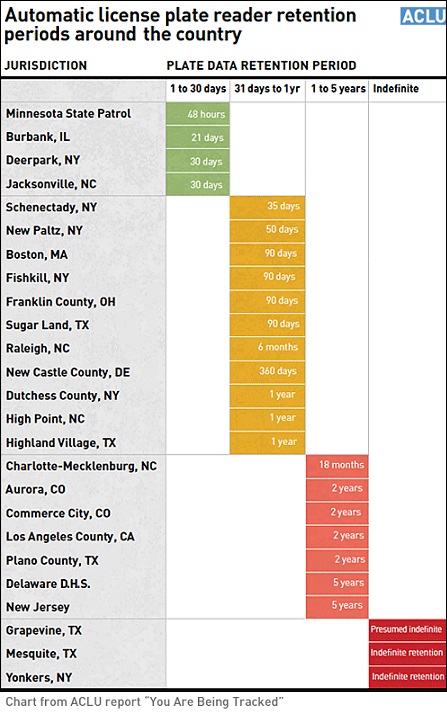
|
|

|
|
| April 20, 2024 |
|
Cops know where you've been via license plate scanners 
Police are recording and storing information on millions of license plates that aren't related to suspected violation of the law or any known activity of interest to law enforcement, according to data collected by the American Civil Liberties Union through Freedom of Information requests in 38 states.
The license-plate scanners look like video cameras and generally are mounted in pairs on either rear fender, the trunk or sometimes the roof of police cars and parking enforcement vehicles. Some also are mounted in stationary locations, such as road signs or bridges. They are "in effect, government location tracking systems recording the movements of many millions of innocent Americans in huge databases," said ACLU Staff Attorney Catherine Crump, the report's lead author. And the ACLU says there is little supervision or control over the data recorded, in most cases without the citizen knowing. The ACLU says that only "a tiny fraction of the license plate scans are flagged as 'hits.' For example, in Maryland, for every million plates read, only 47 (0.005%) were potentially associated with a stolen car or a person wanted for a crime. "Yet, the documents show that many police departments are storing, for long periods of time, huge numbers of records on scanned plates that do not return 'hits.' For example, police in Jersey City, N.J., recorded 2.1 million plate reads last year. As of August 2012, Grapevine, Texas, had 2 million plate reads stored and Milpitas, Calif., had 4.7 million." Milpitas Police Sgt. Frank Morales said Milpitas, population 68,000, "is a small community, but we attract very many visitors. We have a large mall here, the Great Mall" and that could account for the outsize number of license plate records. It's a discount mall situated between two interstate highways and two freeways. The ACLU last summer, in 38 states and Washington, filed nearly 600 Freedom of Information Act requests asking federal, state, and local agencies how they use the readers. The 26,000 pages of documents produced by the agencies that responded, about half, include training materials, internal memos, and policy statements. The rights organization has more than a dozen recommendations for government use of license plate scanner systems and the data collected, including: • Police must have reasonable suspicion that a crime has occurred before examining the data. • Unless there are legitimate reasons to retain records, they should be deleted within days or weeks at most. • People should be able to find out if their cars' location history is in a law enforcement database. (Source: USA Today) Story Date: July 18, 2013
|